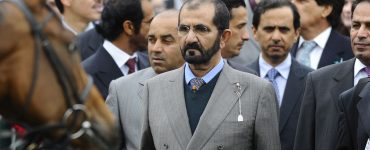By Brian DooleyJuly 9
Brian Dooley is a senior adviser at Human Rights First.
Last week, Sen. Robert Menendez (N.J.), the ranking Democrat on the Foreign Relations Committee, sent a letter to Secretary of State Mike Pompeo warning that the United States “may be obligated by law to terminate all arms sales to the [United Arab Emirates].” Menendez’s move showed that the time has come for Washington to launch a radical overhaul of its relationship with Abu Dhabi.
Menendez’s query follows fresh revelations that high-tech U.S. antitank missiles sold to the UAE have ended up in the hands of Libyan rebel forces fighting to overthrow the U.S.-supported government in Tripoli. That same government has just accused the UAE of using a U.S.-made jet to bomb a migrant center in Libya, killing at least 53 people. In 2014, the Pentagon said the UAE had secretly bombed Libya, much to the surprise and annoyance of U.S. officials.
The UAE currently stands accused of supplying al-Qaeda-linked militias in Yemen with U.S.-made weapons, and of supporting the military junta that has been violently repressing pro-democratic forces in Sudan. All this shows that Abu Dhabi is a profoundly unreliable ally. Yet, the UAE has largely escaped the scrutiny finally imposed on Saudi Arabia for similar misdeeds. That needs to change.
In recent months, congressional critics of Saudi Arabia have grown increasingly vocal over that country’s disastrous war in Yemen and the premeditated murder of Post contributing columnist Jamal Khashoggi. Yet the essential role played by the UAE in Yemen and in other grievous human rights violations goes largely unnoticed.
Earlier this month, a bipartisan group of senators introduced legislation prompted by the Trump administration’s attempt to short-circuit congressional oversight of 22 arms transfers via a dubious “emergency” claim. The bill is snappily titled The Saudi Arabia False Emergencies (SAFE) Act, and makes no reference to the United Arab Emirates. Yet 13 of those 22 “Saudi” arms sales involve the UAE. The weapons involved include hundreds more antitank missiles of the kind diverted to Libyan rebels, along with Apache helicopters and semiautomatic rifles.
Resolutions barring these arms transfers were passed by the Senate on June 20, and similar action is likely in the House. A vocal supporter of arms sales to autocrats, President Trump has already indicated he’ll veto the bills.
Trump has said this even though the UAE-Saudi coalition has dropped U.S.-made bombs on civilians in Yemen — in violation of international law — and even though an al-Qaeda-linked group in Yemen supported by the UAE has obtained U.S.-made armored vehicles. The president has said this also despite credible claims that UAE authorities run secret detention and torture facilities in Yemen.
Recent reports indicate that UAE’s leaders may be trying to extricate themselves from Yemen; the government in Abu Dhabi announced on Monday that it plans to withdrawtroops. They know that that the humanitarian and human-rights catastrophe they’ve created makes for bad public relations. Even so, the UAE should also be getting attention for its massive violations of human rights both at home and abroad.
As is the case in Saudi Arabia, prisons in the United Arab Emirates hold dozens of peaceful activists convicted in sham trials and subjected to torture. Moreover, the two governments often work in concert. Last year, authorities in the UAE seized women’s rights activist Loujain al-Hathloul before handing her over Saudi Arabia. She remains imprisoned there, subjected to torture for her advocacy.
The jailing of Ahmed Mansoor is an example of what happens to Emirati citizens when they dare to criticize the government, no matter how peacefully. Mansoor, a University of Colorado graduate and 2015 winner of the prestigious Martin Ennals Award for Human Rights Defenders, is serving time for posts he made on Facebook and Twitter. His case has been adopted by the Tom Lantos Human Rights Commission in Congress.
When I spent time with Mansoor and other Emirati activists a few years ago, I saw how frightened they were. “State security basically runs the country, no matter who the official government is,” one veteran activist told me. “It’s unaccountable, omnipotent, and scares everyone.”
Since then, what was left of civil society has been silenced, jailed or driven into exile. Both Mansoor and Nasser bin Ghaith, another internationally respected activist (and a graduate of Ohio’s Case Western Reserve University School of Law), are serving 10-year prison sentences.
And it is not only the UAE’s human rights record that should worry Washington. The government in Abu Dhabi is also flirting with Russia. Last year, Mohammed bin Zayed, the UAE’s de facto leader, signed a Declaration of Strategic Partnership with Vladimir Putin, a first for Russia in the Persian Gulf region. The year before that, the UAE struck a deal to buy Russian anti-armor missiles and Sukhoi fighters, and to jointly develop a light-combat fighter jet.
Zayed is also the reported mastermind behind a regional dispute with Qatar that has forced the United States into the awkward position of having to mediate between military allies.
While the U.S. government has been slow to reevaluate its relationship with the UAE dictatorship, other American institutions are pushing for change. New York University’s presence in the UAE has attracted growing criticism, especially since the detention, torture and sentencing of British academic Matthew Hedges. And earlier this year, the Washington-based think tank Center for American Progress announced it would no longer accept funds from the UAE government after allegations of undue influence. Money from the UAE is finally, rightly, becoming an embarrassment.
Arming the UAE as it supports horrific abuses in Libya, Yemen, Sudan and at home should also be embarrassing. In fact, it should be unacceptable. The effort to end unconditional U.S. support for Saudi Arabia is long overdue. But Congress shouldn’t overlook the kingdom’s partner in crime.
Source: The Washington Post 10 July



